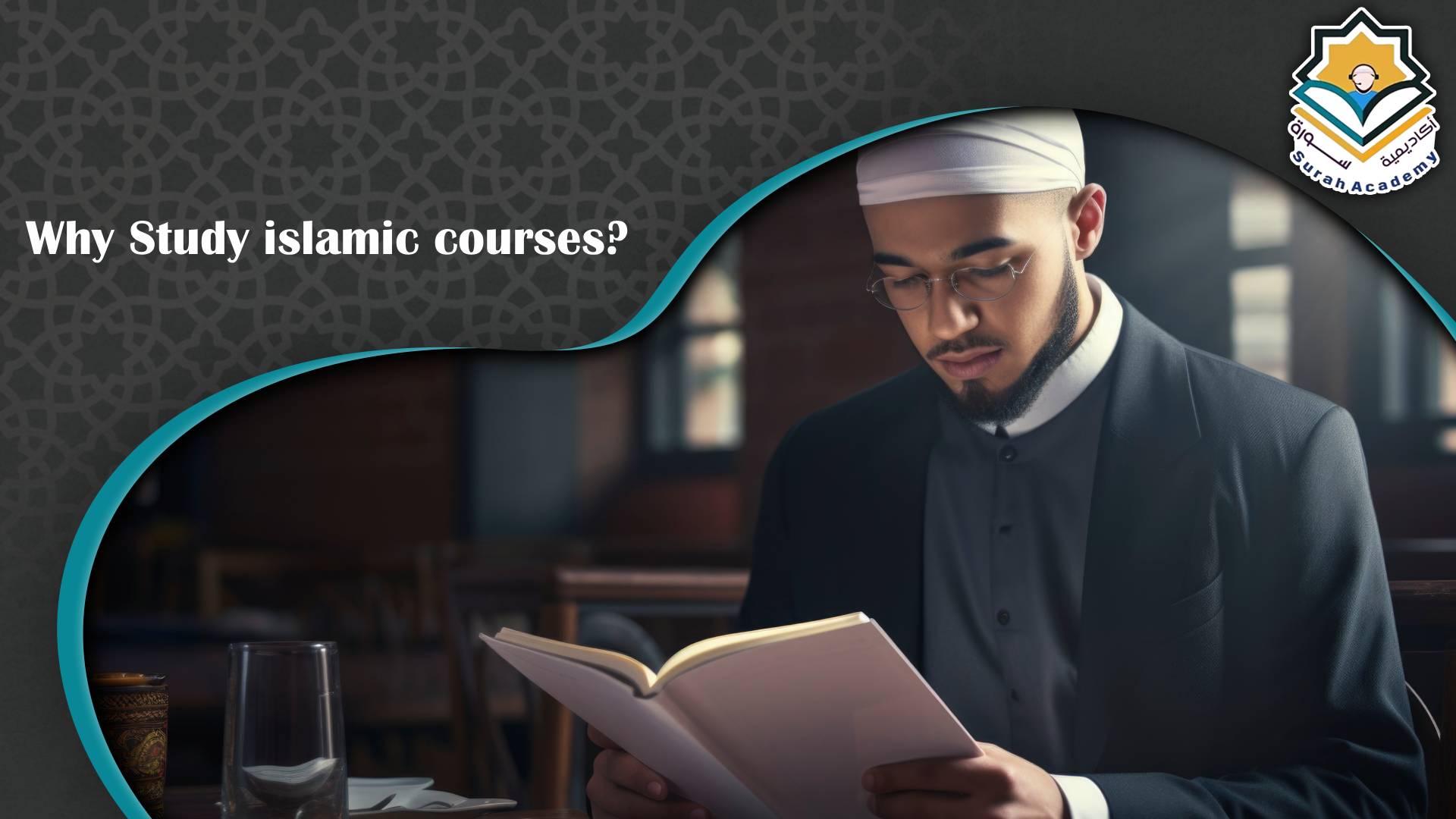The islamic courses offered by Surah Academy provide a comprehensive pathway for individuals seeking to deepen their understanding of Islam, its teachings, and its application in daily life.
These courses cover essential topics such as Quranic studies, Hadith, Islamic jurisprudence (Fiqh), history, and spirituality, enabling learners to build a strong foundation of authentic knowledge.
Whether pursued online or in-person, Surah Academy’s islamic courses allow students to connect with experienced scholars, explore the beauty of Islamic principles, and apply them to foster personal growth and moral excellence.
Why Study islamic courses?

The knowledge and skills gained from studying Islam can be applied across a variety of careers and real-life contexts.Islamic studies provides students with a strong and authentic foundation in Islamic knowledge — something many learners actively seek. In fact, around 98% of our students are Muslim, pursuing these studies for personal growth, intellectual curiosity, or a deep passion for the subject. The program equips them with both knowledge and essential skills, enabling them to articulate what they have learned with confidence. Alongside this, students develop their communication, analytical, and writing abilities, which are crucial for personal and professional growth. For undergraduates in particular, these skills are nurtured to prepare them for future employment.
Through our collaboration with ISRA, we bring unmatched expertise in Islamic studies. Our Bachelor and Master of Islamic Studies programs have been offered for over a decade — a unique opportunity in Australia, as no other university offers these degrees through coursework. This makes our programs highly specialized and valuable.
Many students appreciate the structured, reliable lessons we provide, helping them deepen their understanding of their faith. Peer-to-peer learning is a key component of the experience, fostering interaction between students. While the programs are delivered online, we ensure consistent engagement through weekly tutorials in all subjects, offering students regular contact with both peers and tutors.
This interactive environment creates opportunities for open discussion, question-and-answer sessions, and deeper exploration of various topics. The coursework format also allows students to study across multiple disciplines, covering diverse areas such as Islamic history, spirituality, and language — making the learning journey both comprehensive and enriching.
Begin Your Quran Recitation Journey with Surah Academy Today!
Looking to improve your Quran recitation with proper Tajweed? Surah Academy welcomes students from across the globe to learn online with experienced instructors, flexible scheduling, and customized learning programs tailored to your level. Our courses are designed to help you develop accurate pronunciation, strengthen your connection with the Quran, and grow spiritually—all from the comfort of your home. Don’t wait—start your journey today and see how Surah Academy can transform your Quranic learning experience.

Popular Islamic Studies Programs in the UK
The UK is home to several reputable Islamic academic institutions, each offering unique learning pathways for students seeking to deepen their understanding of Islam. These include:
Traditional Islamic Seminaries
These institutions focus on classical Islamic scholarship, providing students with in-depth religious education. When considering such seminaries, it is important to assess whether they are equipped with modern facilities and resources that can support students in engaging with both traditional Islamic learning and contemporary society.
University-based Islamic Studies Programs
Many UK universities offer degrees in Islamic studies alongside other academic programs. These courses provide advanced scholarship, fostering a deeper understanding of Islamic beliefs, their historical development, and their relationship with other aspects of life. University-based programs often combine academic rigor with opportunities for critical analysis and research.
Online islamic courses
The International Islamic Council of Justice is a leading provider of online Islamic studies programs. These courses have attracted students from around the world, offering a flexible learning option for those unable to attend on-campus classes due to work or family commitments. By offering comprehensive and accessible programs for both Alim and Mufti training, the Council ensures that students can pursue structured and credible Islamic education from anywhere, making online learning an important part of Islamic studies in the modern era.
Factors to Consider When Choosing islamic courses
If you are planning to pursue Islamic studies in the UK with the goal of becoming an Alim or Mufti, it is important to carefully evaluate the program you choose. Here are some essential factors to consider:
Accreditation
Ensure that the institution is accredited by a reputable and authoritative university or body specializing in religious studies. Accreditation guarantees that the program meets high academic standards. Meeting alumni from accredited schools can also give you insights into the quality and credibility of the education they provide.
Curriculum
Review the course syllabus to make sure it covers essential topics such as:
1-Introduction to Islamic jurisprudence
2-History of Islamic legal thought
3-Modern challenges in Islamic education
A well-structured curriculum ensures that you gain both foundational and contemporary knowledge in the field.
Flexibility
Consider your personal schedule and lifestyle. Choose a program of islamic courses not only delivers high-quality education but also offers flexible learning options, such as online islamic courses . Many institutions now provide online study opportunities for students who work, manage family responsibilities, or need adaptable study times.
Faculty Expertise
Look into the qualifications and experience of the teaching staff. Esteemed institutions, such as the International Islamic Council of Justice, often employ scholars with expertise in various branches of Islamic studies, which greatly enriches the learning experience.
Career Prospects
Think about your long-term goals. Are you aiming for leadership roles in Islamic education, scholarly research, or community leadership? Select a course that aligns with your aspirations and will provide you with the knowledge, skills, and opportunities to achieve them.
Preparing for Your islamic courses Journey
If you aspire to become an Alim or join a Mufti program, taking certain preparatory steps can make your learning experience smoother and more rewarding. Here are some tips to get started:
Strengthen your Arabic language skills so that you can read and understand classical texts with ease. A solid command of Arabic will give you a strong foundation for studying Islamic knowledge effectively.
Begin studying essential Islamic texts to familiarize yourself with key concepts, terminology, and principles.
Connect with local Islamic scholars and engage in meaningful discussions about different schools of thought. Building relationships with community leaders can provide valuable guidance and insight.
Listen to Islamic lectures and speeches to gain a broader understanding of the subjects you will encounter in your course.
By taking these steps, you will be better prepared and more confident when you begin your islamic courses, ensuring a stronger and more focused start to your educational journey.
Islamic Jurisprudence [FIQH]
Islamic jurisprudence can be described as the process through which scholars derive legal guidelines, rules, and regulations (Shari’ah) from the principles of the Qur’an and the Sunnah — the sayings and practices of Prophet Muhammad ﷺ, preserved in the Hadith. Over the centuries, successive generations of qualified jurists have refined and expanded upon these rulings through interpretation, analogy, consensus, and disciplined scholarly research.
While the principles found in the Qur’an and Sunnah are unchanging, Islamic jurisprudence serves to guide the practical application of these principles in people’s daily lives and transactions. This adaptability ensures that the eternal values of Islam remain relevant in addressing the needs of changing times and circumstances.
The universality and timeless nature of Islam as a civilisation stem from the fact that the Qur’an and Sunnah provide broad, enduring principles and guidelines. These enable Muslims to develop practical solutions to manage the evolving conditions of their societies. In addition to the Qur’an and Sunnah, other recognised sources of Islamic law include qiyas (analogy), ijma’ (scholarly consensus), and ijtihad (independent, disciplined academic reasoning).
Read also: how to perform wudu
The Benefits of Enrolling in islamic courses Online
In a world where education is increasingly moving to digital platforms, online islamic courses provide a unique opportunity for learners to access authentic knowledge from anywhere. These programs combine flexibility, expert guidance, and diverse resources, making them an ideal choice for anyone seeking to deepen their understanding of Islam without the limitations of location or rigid schedules.
Convenient Access to Diverse Topics
Online islamic courses offer an extensive range of subjects, enabling learners to explore different dimensions of the religion. Whether it’s Quranic studies, Hadith, Islamic history, or jurisprudence (Fiqh), students can select areas of interest that align with their learning goals. From studying the profound teachings of the Qur’an to understanding the life of Prophet Muhammad ﷺ and the principles of Islamic law, online platforms provide a structured and flexible approach to expanding your knowledge.
Flexibility and Self-Paced Learning
One of the most attractive features of online islamic courses is the ability to learn on your own schedule. Unlike traditional classroom settings, online learning accommodates students with busy lifestyles, family obligations, or limited access to Islamic institutions. This flexibility allows you to balance your studies with other responsibilities while progressing at a pace that suits your personal needs.
Expert Instruction and Comprehensive Resources
Most online islamic courses are led by qualified and experienced instructors who specialize in various fields of Islamic scholarship. In addition to expert guidance, students gain access to rich learning materials such as reading lists, multimedia content, and interactive study resources. These tools enhance comprehension and create an engaging, well-rounded educational experience.
Engaging Community and Networking Opportunities
Studying online does not mean studying alone. Many online islamic courses incorporate live sessions, discussion boards, and virtual study groups to encourage interaction between learners and instructors. This global learning community provides opportunities to share perspectives, ask questions, and engage in meaningful dialogue, fostering mutual growth and understanding.
Enhanced Understanding and Practical Application of Islamic Principles
Beyond gaining knowledge, online islamic courses equip students with the skills to apply Islamic teachings in daily life. By studying topics such as Islamic ethics, spirituality, and contemporary issues, learners understand how Islamic principles address modern challenges. This practical approach strengthens moral decision-making and empowers students to positively contribute to their communities.
Cultural Awareness and Interfaith Dialogue
These courses also promote cultural appreciation by highlighting Islamic art, architecture, literature, and scientific contributions throughout history. This deeper understanding encourages intercultural respect and supports constructive interfaith dialogue, helping bridge cultural gaps and strengthen community harmony.
Career and Professional Development
For professionals in fields such as education, counseling, journalism, social work, or international relations, Islamic knowledge can be a valuable asset. Enrolling in online islamic courses not only broadens perspectives but also enhances professional expertise, offering a competitive advantage in careers that require cultural and religious understanding.
Personal Growth and Spiritual Enrichment
Perhaps one of the most profound benefits of online islamic courses is their impact on personal and spiritual development. Studying Islamic principles encourages self-reflection, mindfulness, compassion, and purposeful living. These courses inspire learners to strive for spiritual excellence while integrating Islamic values into their everyday lives.
USUL AL FIQH
Usul al Fiqh refers to the set of principles and methodologies used to derive Islamic rulings (Fiqh) from the primary sources of Sharia. Just as a scientific experiment requires a clear method to ensure accurate results, deriving Fiqh also requires a structured approach—this is what Usul al Fiqh provides. It serves as the framework for interpreting legislative sources and formulating legal rulings in Islam.
Legislative Sources
One of the core discussions in Usul al Fiqh is identifying the legitimate sources of Islamic law. The four primary sources accepted by the vast majority of scholars are:
1-The Qur’an
3-Ijma’ al-Sahabah (consensus of the Companions)
4-Qiyas (analogical reasoning)
Some scholars also recognize additional sources, such as Maslaha al-Mursalah (public interest) and Ijma’ al-Ummah (consensus of the Muslim community), though these are less universally accepted.
The Arabic Language
A deep understanding of the Arabic language is essential in Usul al Fiqh. The grammar, structure, and linguistic nuances of an Ayah (verse) or Hadith directly affect its meaning. Mastery of Arabic grammar rules ensures accurate comprehension and correct application when deducing rulings.
Interpretation of the Qur’an and Sunnah
No ruling can be derived without a proper understanding of the Qur’an and Sunnah. The texts employ various linguistic styles , Recognizing and differentiating between these styles is a crucial skill in Usul al Fiqh, as it ensures that rulings are based on a sound interpretation of the sacred texts.
Significance of Quranic Sciences (Ulum al Quran) in Islamic knowledge
The Qur’anic sciences, also known as Ulum al-Qur’an, occupy a central place in the study of Islamic knowledge. They encompass a broad range of disciplines that deal with the Qur’an’s revelation, preservation, interpretation, and application in the life of Muslims. These sciences serve as the key to unlocking a deeper and more comprehensive understanding of the Noble Qur’an.
Understanding the Miraculous Nature of the Quran
Through the study of Qur’anic sciences, one gains a profound appreciation for the Qur’an’s unparalleled linguistic and literary style. Its eloquence, precision, and depth are themselves a living miracle, capable of conveying profound meanings through concise yet powerful expressions. This unmatched quality is one of the greatest proofs of its divine origin.
Developing a Strong Foundation in Islamic Knowledge
Mastering the Qur’anic sciences lays the groundwork for understanding the broader fields of Islamic theology, jurisprudence (Usul al-Fiqh), and spirituality. These sciences illuminate the core principles of Islam, allowing scholars and learners alike to connect them directly to the Qur’an’s guidance.
Enhancing Correct Pronunciation and Recitation
Disciplines such as Tajweed and Qira’at ensure the correct and precise recitation of the Qur’an, safeguarding its original sound and meaning. Preserving the accuracy of pronunciation is not only an act of devotion but also a means of maintaining the Qur’an’s authenticity for generations to come.
Facilitating Interpretation and Tafseer
Qur’anic sciences provide the necessary tools and frameworks for sound interpretation (Tafseer). They help uncover the multiple layers of meaning embedded in the Qur’an’s verses, enabling Muslims to apply its timeless guidance to the ever-changing circumstances of life.
What Are The Quranic Sciences ?

Understanding it fully requires exploring the many disciplines that explain its meanings, history, and methods of recitation. These interconnected fields are known as the Qur’anic Sciences.
The term “Quranic Sciences” has two technical meanings:
The General Meaning
It refers to the entire field of all sciences and branches of knowledge whose subject of study is the Qur’an, from any perspective. This includes disciplines such as:
Tafsīr – Explanation and interpretation of the Qur’an.
Tajwīd – Correct pronunciation and recitation rules.
Qirā’āt – Accepted variant recitations.
Qur’anic Studies – Broader academic exploration of the Qur’an.
In this sense, the term denotes a unified academic field. For example: “ʿUlūm al-Qur’ān is an important field to learn.”
The Specific Meaning
It refers to each individual science within this field, studied on its own. For example:
Studying Tafsīr means reading a verse and then its detailed explanation.
Studying Tajwīd involves learning and applying the rules of recitation.
Studying Qirā’āt focuses on mastering the different authentic readings.
Here, the phrase is used in plural form, as in: “The Quranic Sciences are important to learn.”
The islamic courses offer a well-rounded and structured approach for individuals seeking to deepen their knowledge of Islam and strengthen their faith. Covering key areas like Qur’anic studies, Hadith, Fiqh, and Islamic history, these courses help students apply Islamic principles in everyday life while fostering spiritual growth. With platforms like Surah Academy, authentic Islamic education is now more accessible than ever, enabling learners around the world to grow personally, positively impact their communities, and preserve the true teachings of Islam for future generations.
